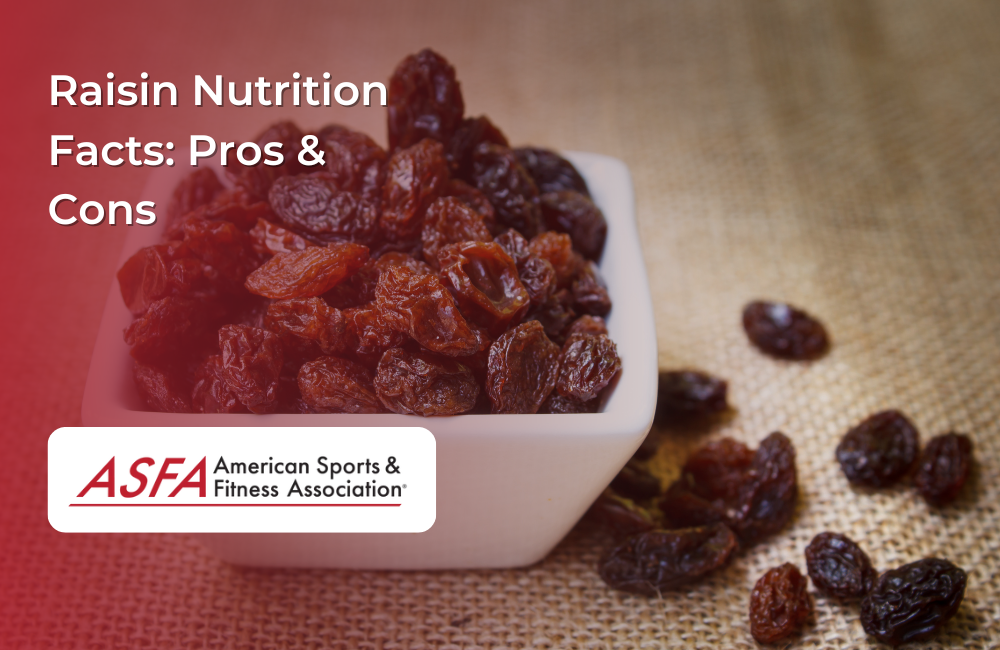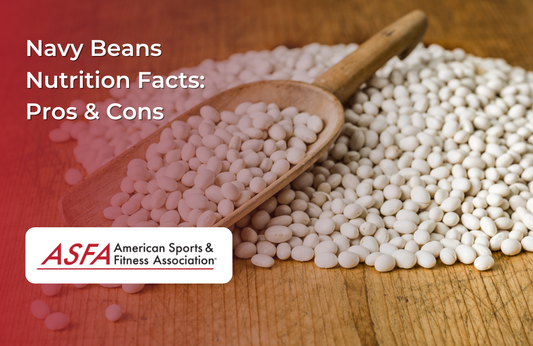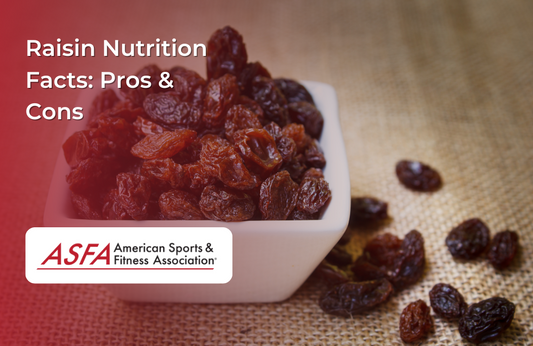Raisins are dried grapes that provide a concentrated source of natural sugars, fiber, and essential nutrients. They are commonly used as a snack, in baking, or as a topping for cereals and salads. While raisins offer several health benefits, their high sugar content and calorie density should be considered when incorporating them into a balanced diet. Understanding their nutritional profile helps determine how they fit into a healthy eating plan.
Raisin Nutrition Facts Pros Cons: Their Nutritional Profile
A one-ounce serving of raisins, approximately a small handful, contains around one hundred twenty calories, thirty-one grams of carbohydrates, one gram of protein, and almost no fat. Raisins are high in natural sugars, providing around twenty-five grams per serving, making them a quick source of energy. They contain fiber, offering about one to two grams per serving, which helps support digestion. Raisins are a good source of iron, potassium, and antioxidants, contributing to overall health and well-being. Understanding the nutritional profile of raisins is essential for formulating effective dietary guidelines that promote healthy eating patterns and overall health.
Introduction
Raisins are a popular dried fruit that has been enjoyed for centuries, cherished for their natural sweetness and numerous health benefits. Made from dried grapes, typically the Thompson Seedless variety, raisins are a convenient and shelf-stable snack that can easily fit into a healthy diet. Packed with energy, fiber, vitamins, and minerals, raisins offer a wealth of nutritional benefits. In this article, we will delve into the nutritional content of raisins, explore their benefits for specific health conditions, and provide tips on how to incorporate them into your diet.
Nutritional Content of Dried Fruit
Raisins are a nutrient-dense food, meaning they provide a high amount of nutrients while being relatively low in calories. A half-cup serving of raisins contains:
-
217 calories
-
47 grams of sugar
-
3.5 grams of dietary fiber
-
1.3 milligrams of iron
-
45 milligrams of calcium
-
1.2 milligrams of boron
-
1.4 milligrams of vitamin C
-
0.5 milligrams of vitamin K
In addition to these essential nutrients, raisins are a good source of antioxidants and phytonutrients, including phenols and polyphenols. These compounds have been shown to possess anti-inflammatory and anti-cancer properties, contributing to the overall health benefits of eating raisins.
Dietary Fiber Content
Raisins are a fantastic source of dietary fiber, which plays a crucial role in maintaining overall health. A 1/2 cup serving of raisins provides about 2.5 grams of dietary fiber, accounting for approximately 10% of the daily recommended intake. This fiber content is a blend of both soluble and insoluble fiber, each offering unique health benefits.
The soluble fiber in raisins helps slow down the digestion of sugars, preventing sharp spikes in blood sugar levels. This makes eating raisins a smart choice for individuals with diabetes or those looking to manage their blood sugar levels effectively. On the other hand, the insoluble fiber in raisins promotes regular bowel movements and helps prevent constipation, supporting overall digestive health.
Incorporating raisins into your diet can thus contribute to better digestive health and more stable blood sugar levels, making them a valuable addition to a balanced diet.
Pros of Raisins
Raisins provide a quick and natural source of energy, making them an excellent snack for athletes or those needing a fast carbohydrate boost. The benefits of raisins include their high levels of fiber, antioxidants, and essential minerals, which aid digestion, support bone health, and help manage cholesterol and blood sugar levels. Made from seedless grapes, particularly the Thompson Seedless variety, raisins contain fiber, which aids digestion, promotes gut health, and helps regulate blood sugar levels. The potassium content in raisins supports heart health by helping regulate blood pressure and electrolyte balance. Raisins contain iron, which plays a role in red blood cell production and helps prevent iron deficiency anemia. They are naturally sweet and can be used as a healthier alternative to refined sugar in recipes.
Cons of Raisins
Raisins are calorie-dense and high in natural sugars, which can contribute to blood sugar spikes if consumed in excess, especially for individuals with diabetes or insulin resistance. However, consuming too many raisins can lead to weight gain, digestive issues, and other health concerns, emphasizing the importance of moderation. Their sticky texture can adhere to teeth, increasing the risk of dental cavities if proper oral hygiene is not maintained. Some commercially processed raisins may contain added sugars or preservatives, reducing their overall health benefits. Eating large quantities of raisins without balancing them with protein or healthy fats may lead to excess calorie consumption and weight gain.
Benefits for Specific Health Conditions
Raisins have been shown to offer numerous health benefits, including:
-
Lowering Blood Pressure: The potassium content in raisins can help lower blood pressure by counteracting the effects of sodium.
-
Regulating Blood Sugar: The fiber content in raisins can help slow down the absorption of sugar into the bloodstream, aiding in the regulation of blood sugar levels.
-
Preventing Constipation: The dietary fiber in raisins promotes regular bowel movements and helps prevent constipation.
-
Supporting Bone Health: The calcium and boron content in raisins contribute to bone health and can help prevent osteoporosis.
-
Reducing Inflammation: The antioxidants and phytonutrients in raisins help reduce inflammation and may prevent chronic diseases such as heart disease and cancer.
How to Incorporate Raisins into Your Diet
Raisins are a versatile ingredient that can be easily added to a variety of dishes. Here are some ways to include raisins in your diet:
-
Snacking: Enjoy raisins as a healthy snack on their own or mixed with nuts and seeds.
-
Baking: Add raisins to your favorite baked goods, such as cookies, breads, and muffins.
-
Oatmeal: Sprinkle raisins on your oatmeal for a sweet and nutritious breakfast.
-
Salads: Toss raisins into your salads for a sweet and crunchy texture.
-
Trail Mix: Combine raisins with nuts and seeds for a healthy and convenient snack.
Remember to eat raisins in moderation due to their high sugar content. A serving size of raisins is about 1/4 cup or 1 ounce, which provides a balanced way to enjoy their nutritional benefits without consuming too many calories or sugars.
Eating Raisins for Better Health
Eating raisins can be a delightful and nutritious way to enhance your overall health. These dried fruits are packed with essential nutrients, including dietary fiber, potassium, and antioxidants, while being low in calories and fat. This makes them an excellent choice for those aiming to lose weight or maintain a healthy weight.
Raisins offer several notable health benefits:
-
Lowering Blood Pressure: The potassium content in raisins helps lower blood pressure, reducing the risk of heart disease.
-
Supporting Healthy Digestion: The dietary fiber in raisins promotes regular bowel movements and prevents constipation, contributing to a healthy digestive system.
-
Reducing Inflammation: Antioxidants in raisins help reduce inflammation, potentially preventing chronic diseases such as heart disease and cancer.
-
Supporting Healthy Bones: The boron content in raisins supports bone health and can help prevent osteoporosis.
Despite their numerous health benefits, it is important to consume raisins in moderation due to their high sugar content. A serving size of about 1/4 cup is recommended, with a daily intake limit of 1/2 cup or less to avoid excessive sugar consumption.
Not all raisins are created equal. For instance, golden raisins, made from Thompson seedless grapes, are lower in fiber and antioxidants compared to sun-dried raisins, which are also made from seedless grapes but retain higher levels of these nutrients.
Incorporating raisins into a healthy diet is easy and delicious. Add them to oatmeal or yogurt for a nutritious breakfast, use them as a topping for salads or baked goods, or enjoy them on their own as a healthy snack. By doing so, you can enjoy the numerous health benefits of raisins while maintaining a balanced and healthy diet.
Conclusion
Raisins are a nutrient-dense dried fruit that provides fiber, iron, potassium, and natural energy. Their digestive benefits, heart health support, and convenience make them a great addition to a balanced diet when consumed in moderation. However, their high sugar content, calorie density, and potential impact on dental health should be considered. Choosing unsweetened, minimally processed raisins and pairing them with protein or healthy fats ensures a more balanced intake while maximizing their nutritional benefits. The benefits of raisins, as a nutrient-dense dried fruit, include their high levels of fiber, antioxidants, and essential minerals, making them a valuable addition to a balanced diet.
FAQs
Are raisins good for weight loss?
Raisins can be part of a weight-loss diet when consumed in moderation, but portion control is important due to their high calorie and sugar content. However, consuming too many raisins can lead to weight gain due to their high calorie and sugar content, so moderation is key.
Can people with diabetes eat raisins without affecting blood sugar?
Yes, but in small amounts. Raisins have a high natural sugar content, so they should be paired with protein or fiber-rich foods to help regulate blood sugar levels.
Following dietary guidelines that recommend balanced portions can help manage blood sugar levels effectively.
Do raisins help with digestion?
Yes, raisins contain fiber, which supports digestion and promotes gut health. The benefits of raisins include their ability to promote gut health and prevent constipation due to their high fiber content.
Are raisins high in iron?
Yes, raisins contain iron, which helps support red blood cell production and may help prevent anemia. Golden raisins also contain iron and offer a sweet flavor and softer texture, making them a delicious and nutritious option.
What is the best way to eat raisins for nutritional benefits?
Eating raisins in moderation, choosing unsweetened varieties, and pairing them with nuts or yogurt can help balance their natural sugar content while maximizing their nutritional benefits.
For a fresh and healthy option, consider making your own raisins at home by drying seedless grapes in the sun or using a dehydrator.





